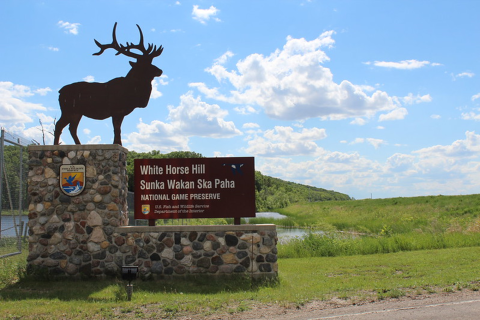‘It will take an act of Congress.’
That’s what Demus McDonald, a Dakota elder from the Spirit Lake Tribe in North Dakota, was told when he first proposed to change the name of Sullys Hill National Game Preserve to White Horse Hill National Game Preserve in northeast North Dakota. The Game Preserve is a part of the U.S. Fish and Wildlife Service’s National Wildlife Refuge System and is on the Spirit Lake Reservation. But that didn’t discourage him. In fact, it made him even more determined. His persistence eventually paid off and he witnessed history in December 2019, when Congress passed the White Horse Hill National Game Preserve Designation Act.
Shortly thereafter, the world was swept into the global COVID-19 pandemic, but a small outdoor ceremony at White Horse Hill celebrated this momentous victory on August 19, 2020. In attendance were several Spirit Lake elders, including McDonald, Tribal Chairman Doug Yankton, members of the USFWS, North Dakota Senators Kevin Cramer and John Hoeven, and others.
To honor this memorable and historic event, and to pay respect to Mother Earth and the ancestors, the Lake Region Drum Group provided the opening song and prayer alongside the presentation of the color guard. The Eagle Tail Drum Group was also in attendance to present a new song they had written called “The White Horse Hill Song.”
It was then that elder, McDonald, told the story of the white horse that used to roam the hills. McDonald talked about why he made it his mission to change the historic Dakota landmark named “Sullys Hill” located in Spirit Lake Nation, back to its original, traditional Dakota name pronounced “shunk-ska-pah-hah” which translates into “White Horse Hill.”
“One of the Elders was told by his parents that when a boat called the Minnie H. used to bring mail across the water to Fort Totten, they would see that white horse come down out of the trees and he would be drinking water from the lake and slowly go back into the woods.”
“There was a wagon trail, and a white stallion would be seen running through the trees,” explained McDonald. “Then it would disappear.” He credited the late respected Tribal elder and mentor, Sam Cloud, for being given this sacred and historic knowledge.
Reminders everywhere evoke painful memories and historical trauma for all Native Americans, and the name Sullys Hill is one such reminder. The name Sullys Hill was a dedication to U.S. Army General Alfred Sully, who led several massacres of the Dakota Nation in the early 1900s — many of whom were McDonald’s ancestors. To the people of the Spirit Lake Tribe, and all native people, the name was a painful reminder of that past. Motivated to put a stop to the continued reminder of these egregious abuses, McDonald set out to right a wrong and change the name of this beautiful place to something more in harmony with its rich natural history.
In an interview from 2014, McDonald said that White Horse Hill represents an important part of Dakota peoples’ past, and their futures. McDonald wanted to ensure that future generations of not only his people, but all people, know the real history of Spirit Lake. It is home to ancient ceremonial sites, a prairie dog town, and many types of forested trees where birds seek refuge surrounding the waters of Spirit Lake. Herds of elk and bison also reside and mate on this wooded expanse of sacred land, where wildlife eat natural medicines that grow underwater. Several other natural medicines freely grow overtop the entire expanse of White Horse Hill, or “shunk-ska-pah-hah.”
Following the naming ceremony, USFWS gave the Spirit Lake Tribe a wolf pelt in a private setting where the Tribe could bless and accept the gift. This gift signified that the USFWS is taking steps to right the wrongs of the past and its commitment to continue to heal the wounds of the past and improve how the Service works with Tribal Nations now and in the future.
During the ceremony, a large sign was unveiled bearing the name White Horse Hill. The sign will be installed along the northbound lane of North Dakota Highway 281. Signs at the Game Preserve entrance and throughout its 1,674 acres have already been changed to reflect the reversion to the area’s original name, given by the Spirit Lake Tribe, welcoming visitors to explore the rich Tribal history of this special place
On October 25, 2020, Demus McDonald made his journey into the Spirit World to be welcomed by his relatives. His life’s work was to perpetuate the Dakota way of life, values, and language. Demus was an ikce wicasa (a common man) who lived a simple life, worked hard, and willingly shared his knowledge. He will be deeply missed and never forgotten.
Written by Melissa Castiano (Diné), USFWS Regional Native American Liaison, from northwest New Mexico. She is of the Mexican Clan, born for the Salt Clan. Her maternal grandmother’s clan is Red Running into Water Clan and her paternal grandmother’s clan is the Mexican Clan. Her role for the USFWS is providing leadership on Tribal engagement and relations within the Missouri Basin and Upper Colorado Basin Regions and the USFWS as a whole.






